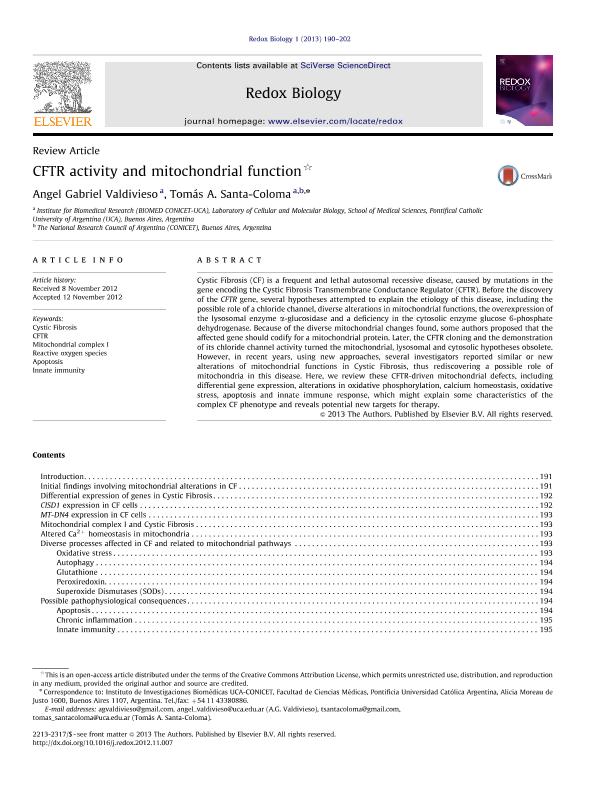Artículo
CFTR activity and mitochondrial function
Fecha de publicación:
01/2013
Editorial:
Elsevier Science
Revista:
Redox Biology
ISSN:
2213-2317
Idioma:
Inglés
Tipo de recurso:
Artículo publicado
Clasificación temática:
Resumen
Cystic Fibrosis (CF) is a frequent and lethal autosomal recessive disease, caused by mutations in the gene encoding the Cystic Fibrosis Transmembrane Conductance Regulator (CFTR). Before the discovery of the CFTR gene, several hypotheses attempted to explain the etiology of this disease, including the possible role of a chloride channel, diverse alterations in mitochondrial functions, the overexpression of the lysosomal enzyme α-glucosidase and a deficiency in the cytosolic enzyme glucose 6-phosphate dehydrogenase. Because of the diverse mitochondrial changes found, some authors proposed that the affected gene should codify for a mitochondrial protein. Later, the CFTR cloning and the demonstration of its chloride channel activity turned the mitochondrial, lysosomal and cytosolic hypotheses obsolete. However, in recent years, using new approaches, several investigators reported similar or new alterations of mitochondrial functions in Cystic Fibrosis, thus rediscovering a possible role of mitochondria in this disease. Here, we review these CFTR-driven mitochondrial defects, including differential gene expression, alterations in oxidative phosphorylation, calcium homeostasis, oxidative stress, apoptosis and innate immune response, which might explain some characteristics of the complex CF phenotype and reveals potential new targets for therapy.
Archivos asociados
Licencia
Identificadores
Colecciones
Articulos(BIOMED)
Articulos de INSTITUTO DE INVESTIGACIONES BIOMEDICAS
Articulos de INSTITUTO DE INVESTIGACIONES BIOMEDICAS
Articulos(SEDE CENTRAL)
Articulos de SEDE CENTRAL
Articulos de SEDE CENTRAL
Citación
Valdivieso, Ángel Gabriel; Santa Coloma, Tomás Antonio; CFTR activity and mitochondrial function; Elsevier Science; Redox Biology; 1; 1; 1-2013; 190-202
Compartir
Altmétricas




